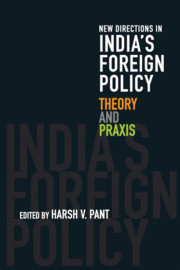Book contents
- Frontmatter
- Contents
- Preface
- 1 Introduction
- Part I Theoretical Evolution
- 2 Power and Indian Foreign Policy
- 3 Constructivism and Indian Foreign Policy
- 4 Exploring Historical Memory and Indian Foreign Policy
- 5 A Doubled Geography: Geobody, Land and Sea in Indian Security Thought
- 6 Foreign Policy Analysis and Indian Foreign Policy
- Part II Emerging Themes
- Bibliography
- Contributors
- Index
3 - Constructivism and Indian Foreign Policy
from Part I - Theoretical Evolution
Published online by Cambridge University Press: 13 November 2018
- Frontmatter
- Contents
- Preface
- 1 Introduction
- Part I Theoretical Evolution
- 2 Power and Indian Foreign Policy
- 3 Constructivism and Indian Foreign Policy
- 4 Exploring Historical Memory and Indian Foreign Policy
- 5 A Doubled Geography: Geobody, Land and Sea in Indian Security Thought
- 6 Foreign Policy Analysis and Indian Foreign Policy
- Part II Emerging Themes
- Bibliography
- Contributors
- Index
Summary
This chapter seeks to examine how scholars have used constructivist approaches in International Relations (IR) to further the study of India's foreign policy. Constructivist approaches to the study of foreign policy focus on the social construction of foreign policy interests. They differ from rationalist, realist and liberal approaches because they do not see foreign policy interests as pre-given and unchanging and take foreign policy discourses and practices of representation seriously rather than dismissing them as ‘mere rhetoric’. Constructivist approaches are also distinct from approaches in foreign policy analysis (FPA) that analyse ‘belief systems’, ‘operational codes’ and ‘national role conceptions’ because these are usually cognitive perspectives that attribute discourses and representations to the individual minds of policymakers. Constructivists question the individualist ontology that informs these accounts, arguing that individuals are fundamentally social beings. They also reject the false assumption that material facts have objective meanings and singular interpretations and point to the empirical impossibility of getting into the individual decision-maker's mind. Instead, constructivist scholars analyse foreign policy discourses – groups of statements that produce particular kinds of knowledge about a topic – and norms – shared ideas about appropriate behaviour – as they are reproduced in public and private statements and foreign policy actions. Rather than being epiphenomenal, discourses and norms are seen by constructivists as key to the process of communication and persuasion with which state officials constitute a world. Moreover, constructivists argue that discourses and norms provide insights into the domestic and international political and cultural environment because they are viewed as inter-subjective structures of rules rather than the product of individual cognitive processes. By using constructivist concepts, like identity and norms, and methodologies, like critical discourse analysis, to analyse the domestic and international social relations that underpin the foreign policy interests and practices, scholars have deepened our understanding of established and new issues in Indian foreign policy. The chapter proceeds as follows. The first part details the emergence of constructivist approaches in IR and discusses the characteristics of the two major variants of conventional constructivism and critical constructivism. The second part of the chapter overviews the ways in which scholars have utilized constructivist approaches in the study of Indian foreign policy. The final part of the chapter illustrates how a constructivist framework can be used, by applying it to understand India's approach to Pakistan, Kashmir and cross-border terrorism under the Narendra Modi regime.
- Type
- Chapter
- Information
- New Directions in India's Foreign PolicyTheory and Praxis, pp. 48 - 66Publisher: Cambridge University PressPrint publication year: 2019
- 1
- Cited by

